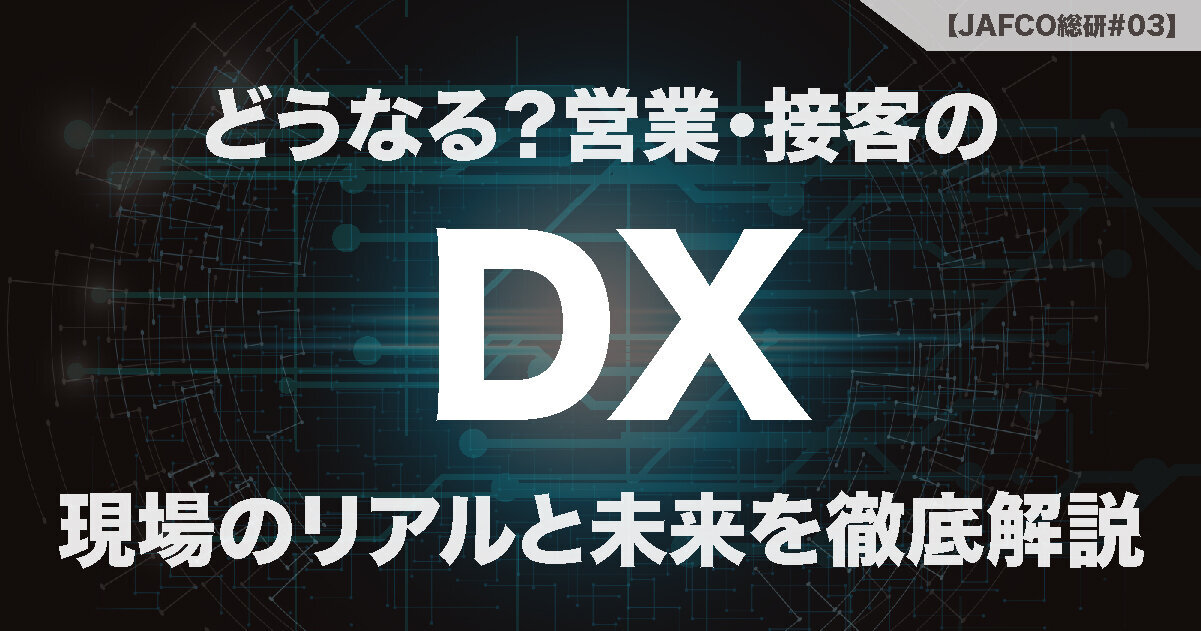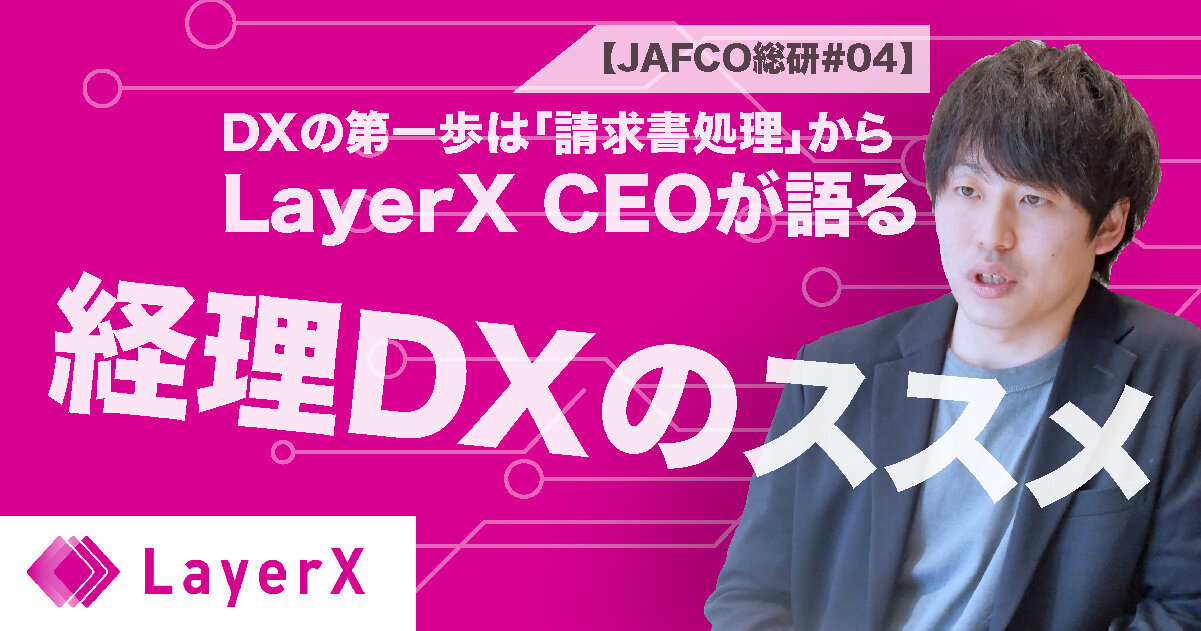It is said that digital transformation (DX) accelerated at a stretch due to the influence of corona in 2020. It can be said that the conversion of sales activities to DX has changed significantly, such as the establishment of online business negotiations.
However, there are still many areas where DX is difficult, and BtoB companies and BtoC companies have completely different senses of challenges. So what is the key to DX success for companies? The JAFCO Group conducted a questionnaire together with Co-nnect Inc., which operates the consulting selection support service "Profit," and gathered the voices of companies as to what kind of sales process they are feeling the challenges of DX. Mr. Yu Sekine, President and CEO of the company, and Yutaro Saka, JAFCO Group Capitalist, will consider the bottleneck in advancing the DX of sales activities.
* If you need the detailed contents and materials of the questionnaire, please contact us from here.
[Speaker profile] (honorific title omitted)
Co-nnect Inc. President and CEO Yu Sekine
After graduating from the University of Tokyo Graduate School of Engineering in 2008, joined the strategic consulting firm AT Kearney. After changing jobs to Deloitte Tohmatsu Consulting, he led the strategic division centered on creating new businesses for large companies and examining medium- to long-term growth strategies as an executive officer in 2015. In 2017, he founded Co-nnect Inc. with the vision of "connecting the wisdom of society to the future." Released "Proffit", the industry's first consulting selection support service that supports the selection of professionals to solve corporate problems. Currently, we have a network of 200 consulting firms and are promoting matching of consultants that meet the issues of companies.
JAFCO Group Co., Ltd. Principal Yutaro Saka
Graduated from the Faculty of Law, Sophia University. Joined JAFCO in 2012. The main investment destinations are Money Forward, Chatwork, WACUL, Karakuri, GIFMAGAZINE, etc. Forbes Japan sponsored "Japan's Most Influential Venture Investor Ranking" No. 2 in 2017. Currently engaged in investment support business.

How will DX in sales activities progress in the future?-For BtoB companies-
Sekine: In DX in sales activities, the issues that have come to light differ greatly between BtoB and BtoC. What are the challenges in BtoB sales activities in the first place? When asked about issues in each process such as target selection, sales material preparation, appointment setting, orders, customer data management (33 responding companies), the issues are customer data management and data utilization of sales know-how. I found it to be an area for improving sales skills.
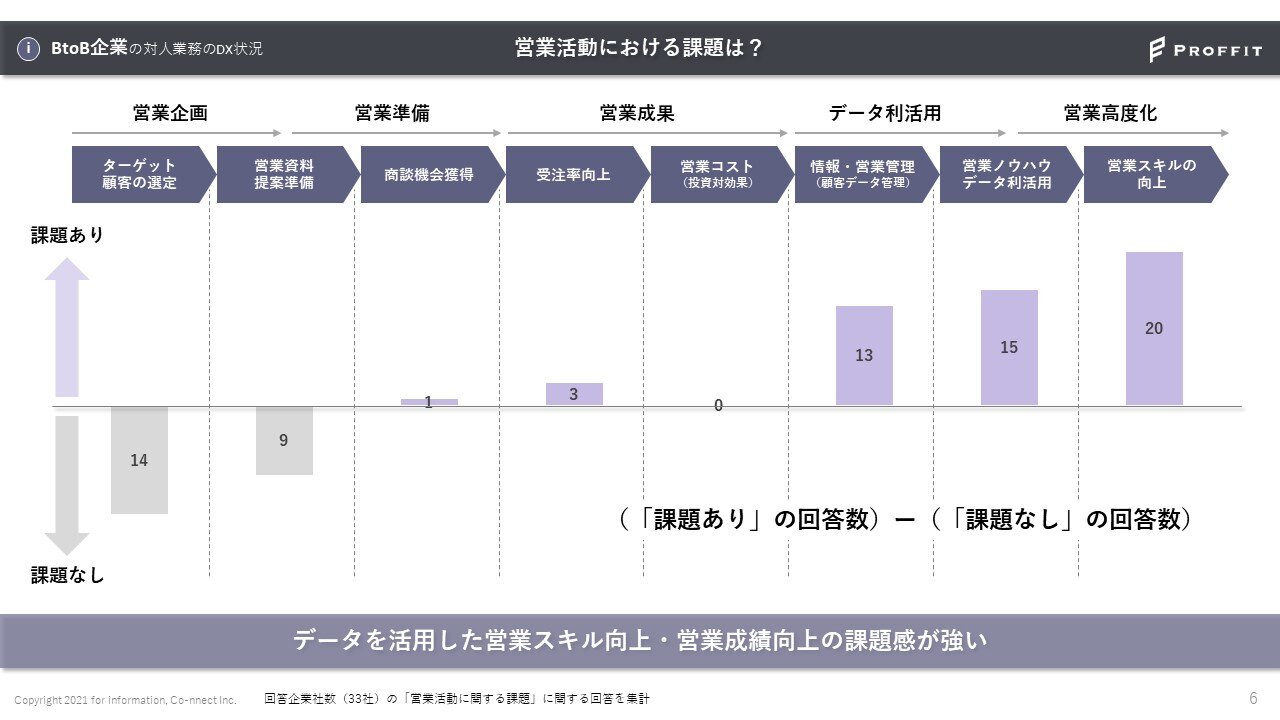
How far has digitalization progressed in sales activities? When asked about the degree of promotion, DX is advancing in terms of making business negotiations online and improving the efficiency of internal information sharing, but digitization is progressing in areas that are directly linked to business performance by improving proposal capabilities, such as improving the order rate and strengthening sales skills. The reality is that it is not progressing.
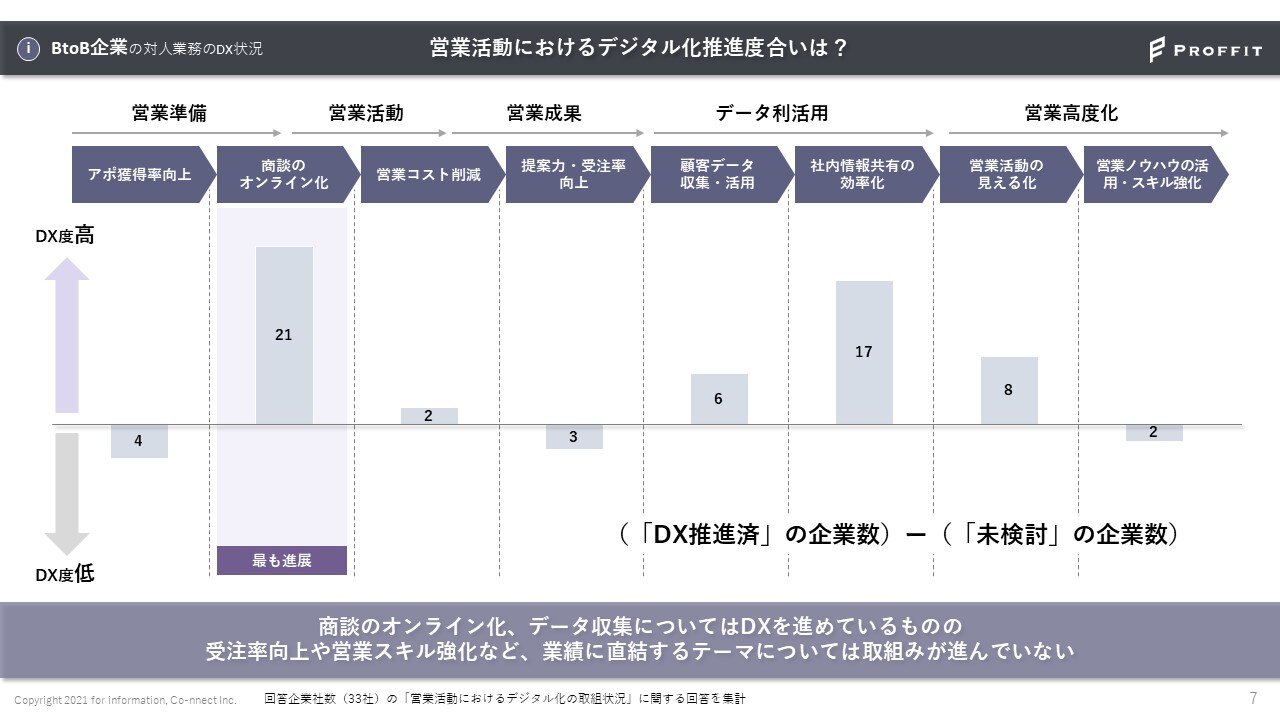
So how much have you achieved by advancing DX? From the results of the questionnaire, we have realized the results of improving the appointment acquisition rate, making business negotiations online, and reducing operating costs. You can see the tendency that you have not realized the growth.
From these results, the direction in which DX should go in the future is shown in the chart as follows.
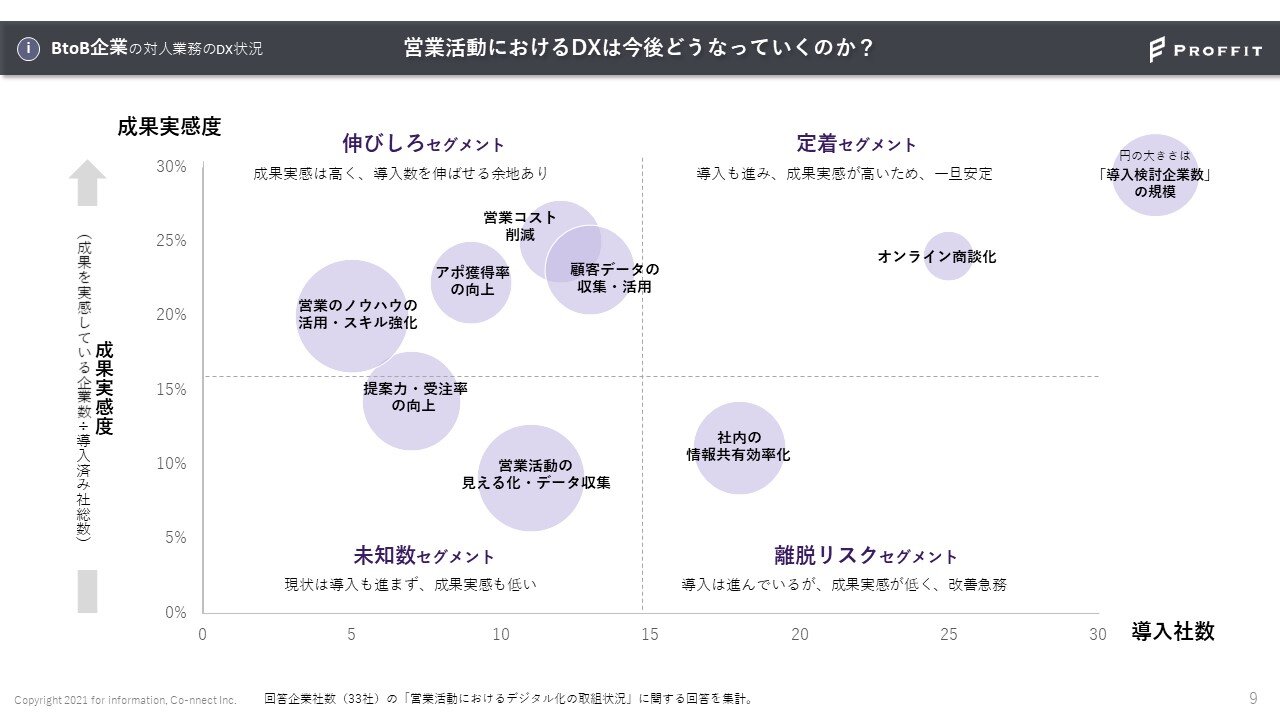
"Online business negotiations", which has a high sense of growth and many companies have introduced it, are expected to take root. "Areas that have a high sense of growth but have not yet penetrated" have room for growth and may become established by advancing DX. In addition, it is conceivable that the efficiency of information sharing within the company, such as "the introduction is progressing but there is no sense of growth," will result in withdrawal from DX as a reaction to the improvement of the sense of growth.
Saka It's interesting to look at the numbers and figures in this way. As a capitalist, I have invested in many SaaS startups such as Money Forward, Chatwork, and WACUL, which was listed in February this year.
Originally in a rapidly changing industry, various products have been created according to the needs of the times, but the movement in the year 2020 is particularly rapid. The online business negotiations have taken root in the last year. I have the impression that the efficiency of in-house information sharing has progressed considerably from before Corona by using chat tools, etc., and it is one of the most exciting areas in the startup area as a product.
As a hypothesis that this is in the withdrawal segment, there may be a point that the way of internal communication has changed in the first place due to the penetration of remote work. It can be said that new issues are beginning to emerge, such as the use of tools based on going to work and face-to-face is no longer effective.
Sekine That's right. Through the changes over the past year, are there any challenges in product development for SaaS startups? Also, what do you think will happen to DX in sales activities in the future?
Saka Many products are developed in anticipation of changes in communication. I think it will be a tailwind even after 2020, when DX accelerates. Many players have also appeared in the "improvement of appointment acquisition rate" in the growth segment, and it seems that the number of solutions for improving the efficiency of appointment acquisition has increased rapidly in the last three years. I think that the reason why the order rate has dropped is that online has made it easier to make appointments due to the flexibility of time and place.
As a product development to increase the effective appointments that lead to orders, for example, there is a service that creates a database of which SaaS the business partner has introduced. If you know that, you will be able to make proposals such as "If you have a certain SaaS service, you should introduce this service together and cooperate with it." I think that the targeting of users will become clearer through data conversion, and the "appointment acquisition rate" and "improvement of order rate" will shift to the retention segment.
Sekine According to the questionnaire, more than 60 % of companies are considering continuing online business negotiations. While many merits such as "increased number of business negotiations per day", "easier to make appointments", "increased attendance rate of authorizers / seniors", etc. were raised, "customer reaction was raised. Some say that it is difficult to grasp and it is difficult to shorten the sense of distance from customers.
How are startups working to strengthen their sales capabilities in online business negotiations?
Saka: There are many groping parts, but for example, there was a startup that analyzed high-performer analysis of sales using tablet data. An analysis of how many slides were used during negotiations revealed that less material was used by high performers. By following the sales activities of high performers, it is thought that it will be possible to improve sales skills and the contract rate.
In addition, now that the technology for automatically transcribing voice is improving, it may be possible to convert online conversations into text and analyze the tendency of words used. If we can extract and share the necessary information, the way information is shared may change.
Sekine On the other hand, the reality of "corporate culture" as a barrier to advancing DX has also become apparent from the results of the questionnaire.
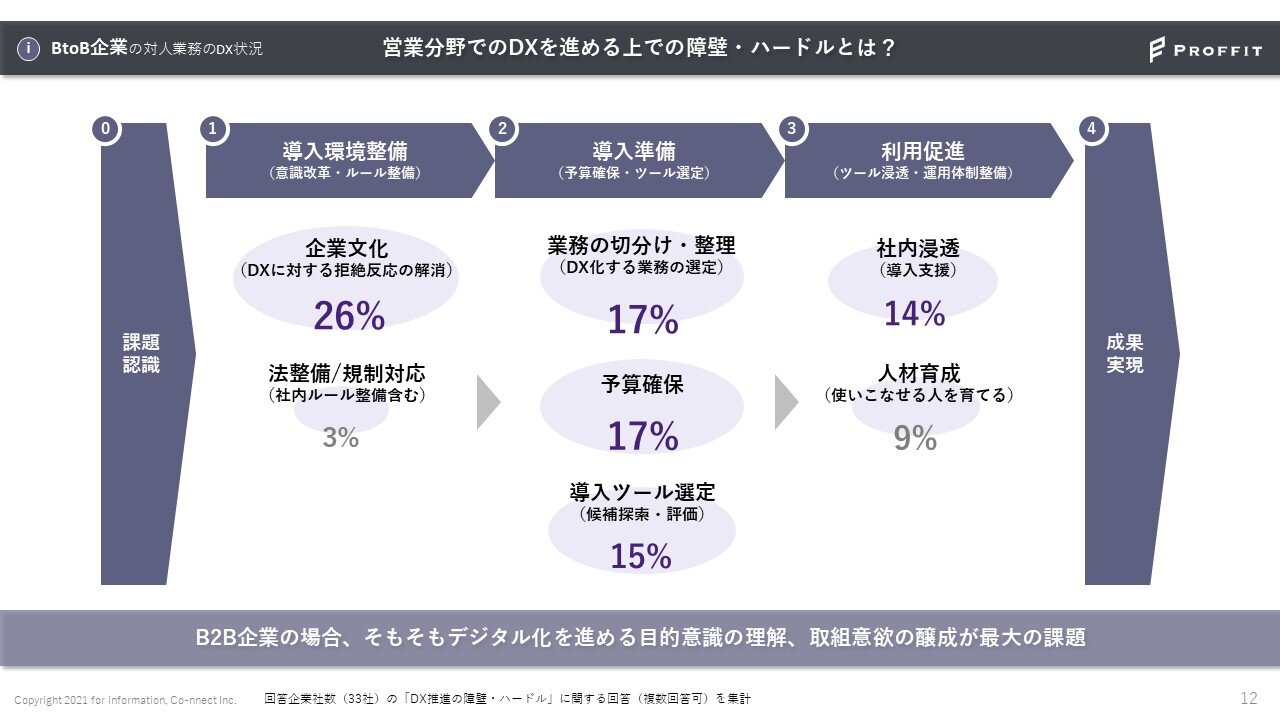
Even if we proceed with internal discussions to introduce it, it is difficult to pass the approval. There are opposition from the successful experience of senior management that "sales is to meet customers and build relationships", it is difficult to explain what kind of results DX can achieve, and it is practical to change the way it has been done so far. It is said that there are various hurdles such as cost becoming a bottleneck.
What can be obtained by changing it? It turned out that the big point is how much customer success can be shown before the introduction.
How will DX in sales activities progress in the future?-For BtoC companies-
Sekine At, what are the challenges for BtoC companies? When we conducted a questionnaire to 14 companies, we found that there was a sense of challenge in all areas, from "recruitment and training of customer service staff" to "effective customer service implementation" and "advancement of customer service skills".
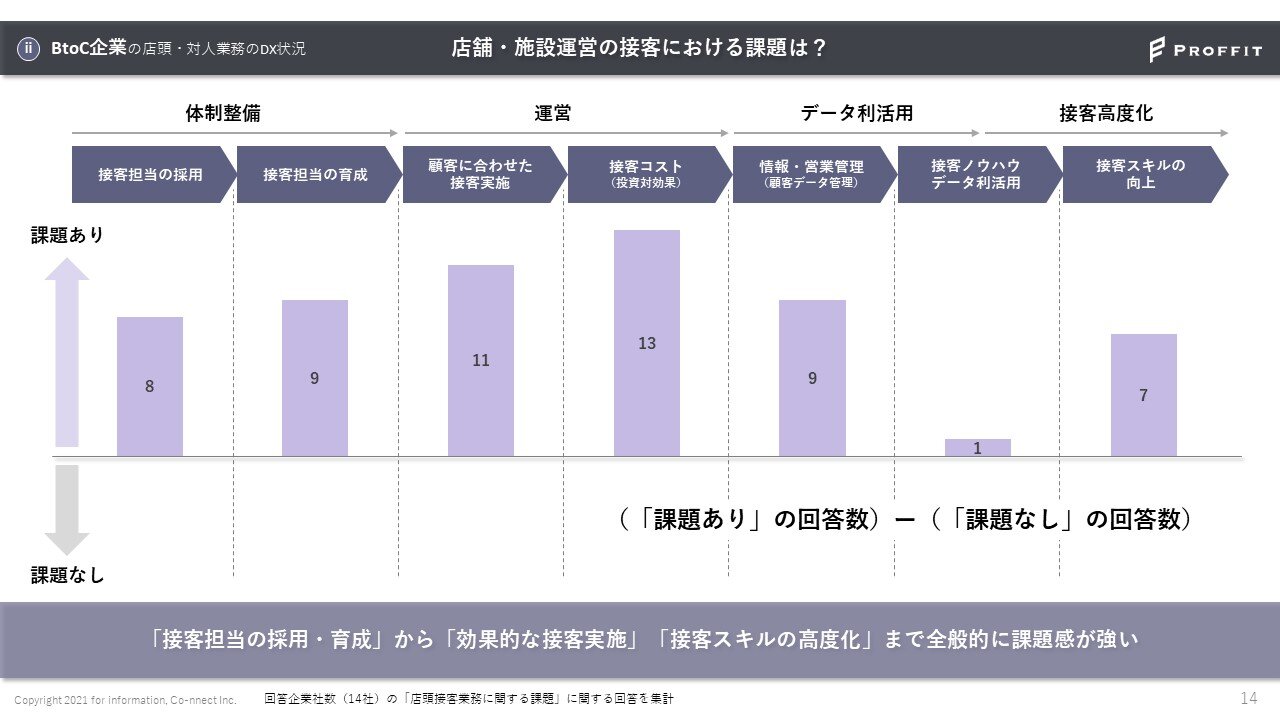
In terms of the actual degree of DX promotion, there is a tendency for a relatively large number of companies to work on "online customer service" and "utilization of customer data when serving customers." However, the actual feeling of results is limited to the part where some customer service and information sharing have become more efficient, and "it is difficult to realize that even if customer service is online, it leads to labor saving." It's smoother to do it. "
Even if we analyze DX trends in the future, there is no fixed segment at this point, and it is thought that there is a risk of withdrawal from online customer service and utilization of customer data during customer service.
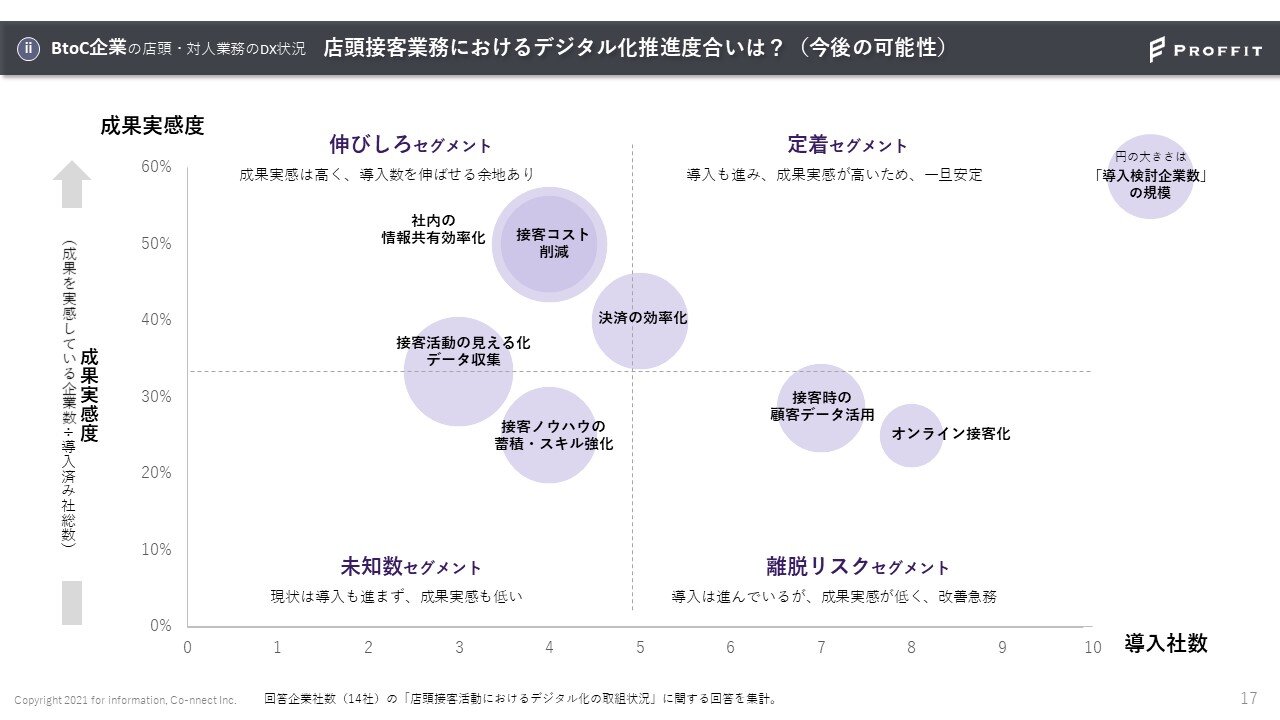
Saka: I think that many BtoC companies are considering introducing the reduction of customer service costs through online customer service. Even at JAFCO's investee companies, there is a strong need to replace them remotely in customer service operations that have standard flow manuals such as mass retailers, hotels, and karaoke. Due to the difficulty of hiring due to a shortage of human resources, the need for online customer service will continue to increase in the future. What is behind the lack of realization of the results of online customer service?
Sekine: I think there is a big difference between the business that can be handled by standard customer service and the business that is close to sales that motivates purchases. It seems to be quite difficult to make apparel customer service online. In addition to labor saving, if a customer service framework with added value unique to digital can be created, DX may progress in the future.
Saka That's right. Even from a global perspective, the quality of customer service is extremely high in Japan. Replacing this with online can be a hurdle due to the high level of service. It is also related to how much the business custom of purchasing at stores will change in the future. There is plenty of room to think about how to change the store experience.
Sekine According to the questionnaire, 90 % of the current over-the-counter customer service operations are face-to-face. More than 60 % of companies answered that they would positively consider digitization of their operations, and it is thought that there is an opportunity because there is a large gap with the current situation.
However, for BtoC companies, the biggest bottleneck of DX is human resource development and in-house penetration. There are many industries in which the mobilization of human resources is intense, and there is concern that the cost of education to get them to use it will be heavy. There are many voices saying that the results cannot be predicted because they have not done it yet, and that even if the tools are introduced, they will not be able to be used. This is a big difference from BtoB companies.
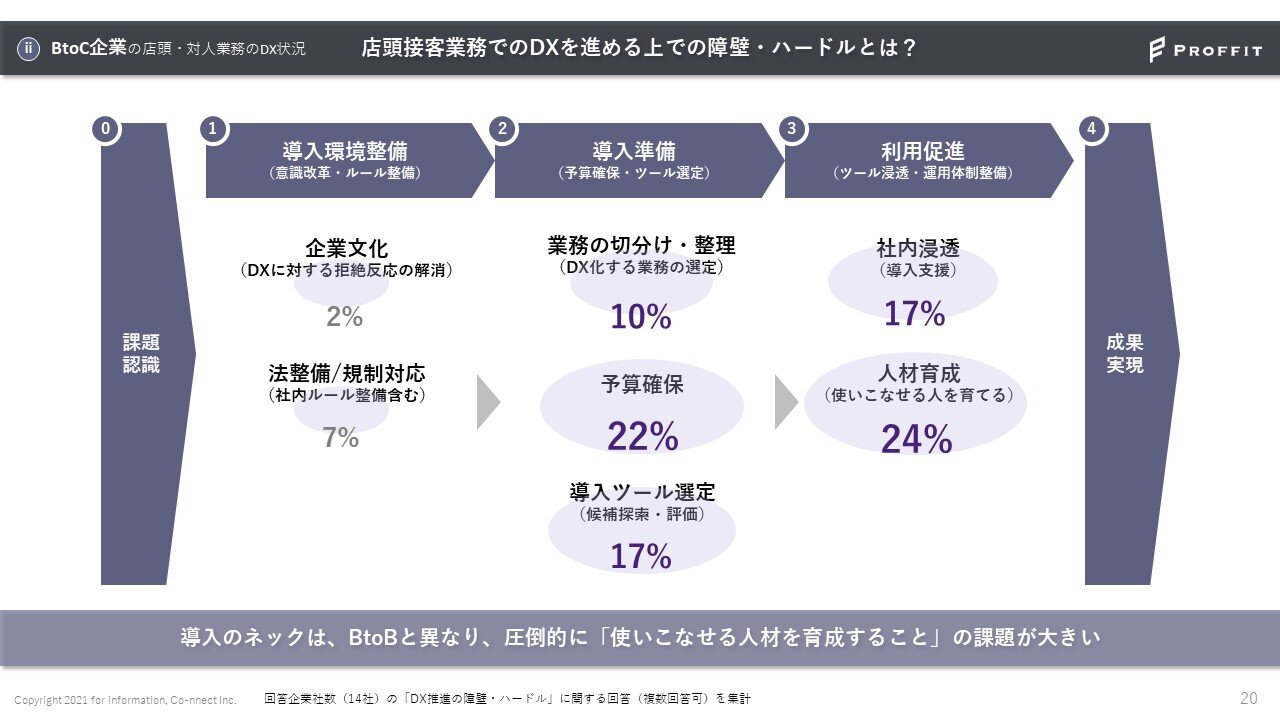
Saka That's right. JAFCO's investment destinations that provide training video services for restaurants are very particular about UI / UX. Like consumer apps, we are developing products with an awareness of how easy it is to use and how easy it is to operate intuitively.
Sekine I see. At the customer service site, UI / UX is important from the perspective of developing part-time staff. It can be seen that BtoC companies have no voice of barriers due to corporate culture, and have a strong sense of crisis and impatience that "the labor costs of customer service are costly and are putting pressure on management." However, the current situation is that I don't know where and how to proceed with DX.
I think it is realistic to proceed in separate steps, such as "Let's use this individual tool to reduce costs by 0% in this area."
What are the requirements for DX success for companies?
Sekine Once again, what is DX?
Establishing an advantage in surviving changes in the environment by transforming services, business models, processes, and organizations by utilizing data and digital technologies to meet the challenges that impede corporate growth.
(* Refer to the DX guidelines of the Ministry of Economy, Trade and Industry).
I have a strong image of data utilization, but I feel that there are often no concrete discussions about "what kind of problem-solving is used to solve the problem and how the company is aiming to change by doing so". For this reason, it is not uncommon for people to try to introduce high-spec tools that do not conform to the current situation, and to withdraw without being able to penetrate and train within the company.
In order to imagine what is ahead of DX, it is important to grasp the issues in the order of "transformation with digital" and draw what kind of state it will be if it is solved.
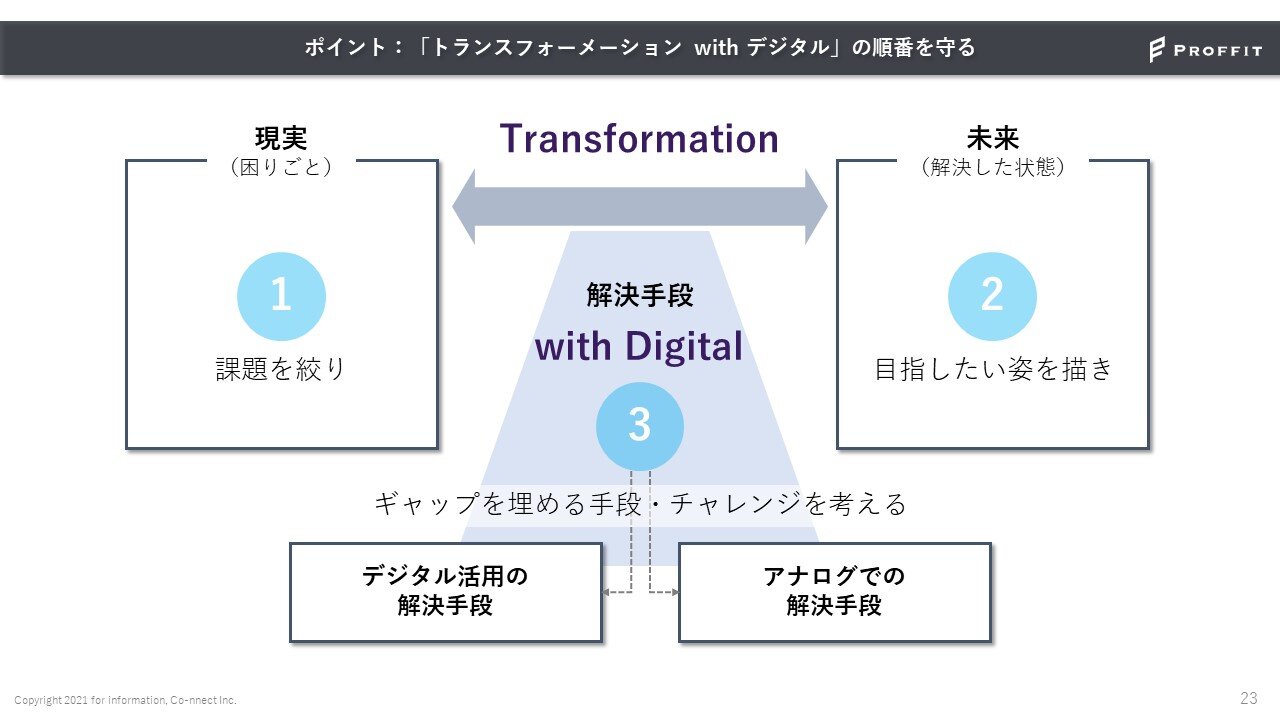
Saka: In addition to the introduction of individual tools, drastic changes such as renewing the core system tend to raise concerns about the cost of adapting to changes. Even within JAFCO, we are facing that very challenge, and I once again felt that it is important to discuss from the perspective of "transformation with digital" and share the goals we aim for internally. Thank you very much for your valuable talk today.

